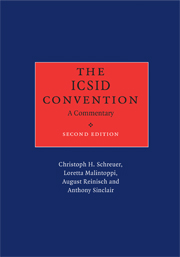Book contents
- Frontmatter
- Contents
- Foreword by Professor Sir Elihu Lauterpacht, CBE, QC
- Authors' preface to the second edition
- Table of cases
- List of abbreviations
- Text of the ICSID Convention
- Procedural calendar
- PREAMBLE
- CHAPTER I International Centre for Settlement of Investment Disputes
- CHAPTER II Jurisdiction of the Centre
- CHAPTER III Conciliation
- CHAPTER IV Arbitration
- Article 36 Request for Arbitration
- Article 37 Composition of Tribunal
- Article 38 Appointment by Chairman
- Article 39 Nationality of Arbitrators
- Article 40 Qualities of Arbitrators
- Article 41 Decision on Jurisdiction
- Article 42 Applicable Law
- Article 43 Evidence
- Article 44 Rules on Procedure
- Article 45 Default of a Party
- Article 46 Ancillary Claims
- Article 47 Provisional Measures
- Article 48 Award
- Article 49 Dispatch, Supplementation and Rectification
- Article 50 Interpretation
- Article 51 Revision
- Article 52 Annulment
- Article 53 Binding Force
- Article 54 Enforcement
- Article 55 State Immunity
- CHAPTER V Replacement and Disqualification of Conciliators and Arbitrators
- CHAPTER VI Cost of Proceedings
- CHAPTER VII Place of Proceedings
- CHAPTER VIII Disputes between Contracting States
- CHAPTER IX Amendment
- CHAPTER X Final Provisions
- Final Clause
- Consolidated bibliography
- Index by article
- Index by subject
Article 39 - Nationality of Arbitrators
from CHAPTER IV - Arbitration
Published online by Cambridge University Press: 07 September 2010
- Frontmatter
- Contents
- Foreword by Professor Sir Elihu Lauterpacht, CBE, QC
- Authors' preface to the second edition
- Table of cases
- List of abbreviations
- Text of the ICSID Convention
- Procedural calendar
- PREAMBLE
- CHAPTER I International Centre for Settlement of Investment Disputes
- CHAPTER II Jurisdiction of the Centre
- CHAPTER III Conciliation
- CHAPTER IV Arbitration
- Article 36 Request for Arbitration
- Article 37 Composition of Tribunal
- Article 38 Appointment by Chairman
- Article 39 Nationality of Arbitrators
- Article 40 Qualities of Arbitrators
- Article 41 Decision on Jurisdiction
- Article 42 Applicable Law
- Article 43 Evidence
- Article 44 Rules on Procedure
- Article 45 Default of a Party
- Article 46 Ancillary Claims
- Article 47 Provisional Measures
- Article 48 Award
- Article 49 Dispatch, Supplementation and Rectification
- Article 50 Interpretation
- Article 51 Revision
- Article 52 Annulment
- Article 53 Binding Force
- Article 54 Enforcement
- Article 55 State Immunity
- CHAPTER V Replacement and Disqualification of Conciliators and Arbitrators
- CHAPTER VI Cost of Proceedings
- CHAPTER VII Place of Proceedings
- CHAPTER VIII Disputes between Contracting States
- CHAPTER IX Amendment
- CHAPTER X Final Provisions
- Final Clause
- Consolidated bibliography
- Index by article
- Index by subject
Summary
INTRODUCTION
The drafts leading to what eventually became Art. 39 were the subject of much discussion during the Convention's drafting. The Preliminary Draft sought to exclude nationals or co-nationals of parties from appointment as arbitrators without exception (History, Vol. I, p. 182). The debates on this provision showed opposing views. Some delegates were in agreement with the exclusion of national arbitrators in order to avoid any lack or even semblance of lack of impartiality. Another group thought that arbitrators possessing the nationality or co-nationality of the parties were useful sources of information on the law and position of the parties and would inspire the parties' confidence in the arbitration process (History, Vol. II, pp. 265, 266, 295, 306, 329, 386, 387, 416, 417, 487, 489, 510, 511, 512, 569). The First Draft tightened the provision by also excluding persons who had been designated to the Panel of Arbitrators by either of the two States. After further debate (at pp. 663, 789), several votes were taken. These showed a majority against the total exclusion of national arbitrators. There was also a majority for the proposition that national arbitrators should never constitute a majority on a tribunal. Another vote approved an exception where the parties were in agreement on the person of each arbitrator (at p. 789).
- Type
- Chapter
- Information
- The ICSID ConventionA Commentary, pp. 498 - 506Publisher: Cambridge University PressPrint publication year: 2009



